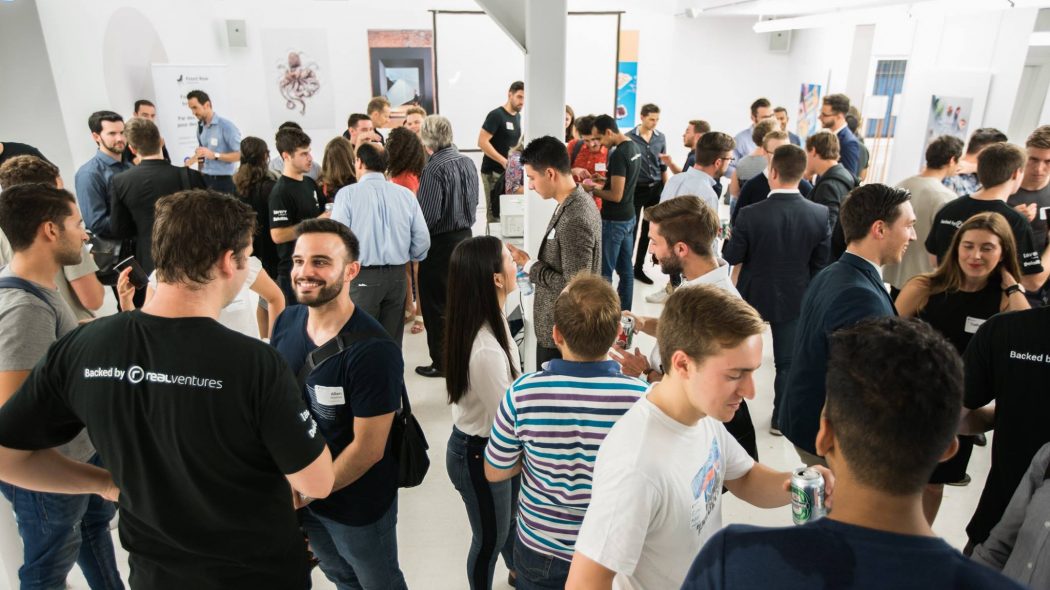On a rainy Wednesday night, a Saint-Denis art gallery was home to the launch of a unique event in Montreal. The launch of Front Row Ventures (FRV), the city’s first student-run venture capital firm, on Wednesday September 27th at the Livart, provided a window into the company’s novel business model. Ultimately, the goal of FRV is to unlock the potential of student-run startup companies. However, what sets this company apart is that its investment decisions are influenced and ultimately decided by a crack team of student capitalists.
To create FRV, all it took was three students and their determination. The story of this new student-based venture fund starts with three self-taught student entrepreneurs. Raphael Christian-Roy, Éléonore Jarry Ferron and Nicolas Synnott, the founders of FRV, first pitched the idea of a student-run Venture Capital (VC) fund to Real Ventures, a Montreal-based tech VC. After subsequent meetings and frequent remolding of the concept, Real Ventures finally moved forward to provide $600K of initial capital in order to conceive FRV. The inception of FRV marks the first company of its kind in Canada, while underlining the flowering growth of the student-run VC model across the globe.
The new student-run VC will identify 24 startups which will all receive an equal investment of $25K in order to boost the company’s cash reserves at its early stages. In return, FRV will take at least 2.5%-with a cap at $1M valuation. If the company is worth $10M, for example, then the 5% equity will be calculated on the $1M basis, instead of 10. The company is built around the objective of helping students in exchange for the promise of future returns down the line. The startup will also receive expert advice from prominent consulting firms including Lavery, Deloitte, Volume7, and Immersion. This, along with the far-reaching contacts of the FRV and Real Venture teams, form an incredible offering for any early-stage startup.
The company is built around the objective of helping students in exchange for the promise of future returns down the line
The student-run VC model has already been implemented in the USA (with Dorm Room Fund) and in Asia, which partly inspired the FRV founders to make the jump. Although many doubted these VCs, it seems most of them have created great value for their initial financial backers. This is partly due to the fact that most VCs wouldn’t touch the campus startup market, which in turn created the opportunity to tap into this market for firms such as Dorm Room Fund and FRV.
More recently, Raphael, Éléonore and Nicolas were charged with building a team of student investors. These students, constituting a balanced basket of the Montreal student population, are united in their passion for startups, resilience and the ability to search for talent. This group of 17 student investors was molded out of 80 candidates. After a year of preparation with field trips to meet VC gurus and periods of deep research into specific industries, the group was finally ready. This training period was pivotal in getting everyone to the same level of knowledge on all relevant industries. The group is subdivided into 4 clusters, with each being responsible for their respective campus in Montreal (UQAM, UdeM, Concordia, McGill). Each cluster, led by a partner, scouts for talented founders of startups, and, after their approval has been given, takes the founder to meet and eventually pitch to the rest of the FRV team.
The two main criteria to assess value, according to FRV, are the team and the idea
The investor meetings occur every month and a vote is taken to decide to invest or not. The two main criteria to assess value, according to FRV, are the team and the idea. The team composition, since only a founder with a resilient and driven team will be able to execute the project with conviction. The product must be innovative, unique, and needs the potential to eventually make a profit. With the financial backing they have received, FRV is in a prime position to judge startups on criteria beyond short-term returns. This could mean that their eyes are open to more important growth factors such as the human aspect of a company.
After the pitch, the voting takes place. There are 8 voters, 3 founders and 5 cluster partners, and a 2/3 vote in favour is required. Cluster partners can decide either to voice the opinion of their cluster or to exercise their own judgement. This voting structure is fairer and more rigorous than most VCs’, emphasizing that the founders truly believe that their partners have an opinion as valuable as theirs. This theme is pivotal for the self-sustainment of the company, since as soon as a member of the team graduates, they will need to be replaced. Thus, founders are incentivised to give as many responsibilities as possible to student investors so that they can learn, and, eventually, become part of the executive team.
As far as McGill students are concerned, there are 5 student investors within our ranks, hailing from different faculties. They will be scouting the campus for startup founders by hosting events and reaching out to people both inside and outside of their social circles. Student entrepreneurs in Montreal are encouraged apply online or reach out directly to the student partners in order to get their ideas noticed.
Although this is a great advancement, Montreal still has a lot of ground to cover in terms of venture capital and startups. The name of the city has yet to be included in both the top 20 in Startup Genome’s startup index and Martin Prosperity Institute’s total venture capital investment rankings. The recent advancements in AI-oriented ventures, including the recent announcement of a McGill-Facebook research lab collaboration, provide hope for the future. This, combined with the new FRV venture, lends legitimacy to the Montreal startup community.
The views and statements expressed in this article are the author’s own and do not necessarily represent those of The Bull & Bear.


